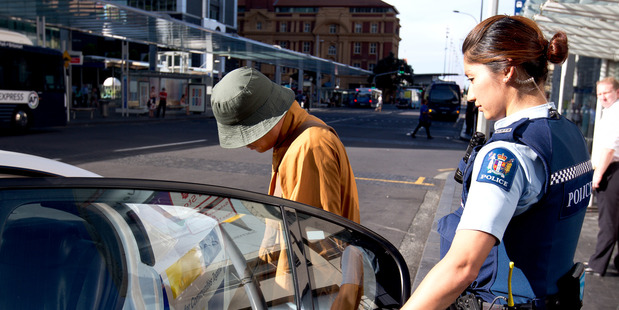
A Chinese syndicate is behind the scam, says the woman, who was recruited while living in China.
For a fee of 10,000 renminbi ($2065), she could become a Taoist nun, traditional Chinese medicine (TCM) street doctor or a fortune teller. Recruits could make their fortunes on streets around the world, she said.
"We were told that if we wanted to go to Western countries, then becoming monks or nuns were the better options, because the West is still not so open to Chinese fortune telling or TCM," said the woman.
"The cash collected is shared with the syndicate leaders; the percentage split is done by negotiation."
The fee she paid got her a grey Taoist nun outfit and materials such as wooden beaded prayer bracelets, amulets and images of Buddha and Kuan Yin (the goddess of mercy) to support her solicitation.
The week-long training conducted in her native Zhejiang province included how to size up and approach donors, and knowing when to walk away and when to run.
The week-long training conducted in her native Zhejiang province included how to size up and approach donors, and knowing when to walk away and when to run.
The syndicate helped with immigration and travel arrangements to send candidates overseas.
However, she pulled out, and says she was threatened and had to leave China to flee the syndicate.
Begging monks and nuns have been reported operating around the world, including in Australia, New York, Canada and Singapore.
In the past year, at least three begging monks in Auckland and Wellington have been spoken to by police here, sparking warnings last week for Auckland residents to stop giving money to Queen St beggars.
Immigration New Zealand said it was not aware of the syndicate, but was seeking more information so it could look into the matter further. Last week, a man wearing a monk robe and Nike shoes pestered a Herald reporter for money after handing him a prayer bracelet.
The bracelets could bring blessings, he said, and the bigger the donation, the bigger the blessing it would bring from Buddha.
The man claimed to be a Thai monk and showed the reporter a notebook filled with the names of donors and the amounts given.
At the back of the notebook was a photo of a temple under repair, but the man would not say where it was.
At first, he asked for a small donation to cover the cost of the bracelet, but then asked for money to help cover his airfare and a larger amount to help with urgent temple repairs.
When the reporter identified himself and asked further questions, the man immediately claimed he spoke no English and fled.
The woman said fake monks trained by the syndicate would follow similar scripts.
Those who had borrowed money from loan sharks at high interest rates to pay the syndicate would feel pressured to be more aggressive in their approach, she said.
Last week, an Auckland woman was left "annoyed and afraid" in Vulcan Lane after a monk got angry when she refused to give him money.
Another was pressured into giving a monk $10 after he followed her into a Queen St shop and asked her to get cash out with her Eftpos card.
In March last year, Wellington police spoke to a man dressed as a monk after he pressured people into making large donations.
Immigration NZ spokesman Marc Piercey said two individuals under investigation had two-year multiple-entry visitor visas issued because they said they wanted to do some sightseeing in New Zealand.
The Herald understands one of them is a Chinese 38-year-old who arrived on New Year's Eve.
Mr Piercey said a decision would be made on whether there were grounds to cancel their visas to prevent them from returning here.
"[Immigration NZ] would certainly not approve visitor visas for people intending to come to New Zealand as professional beggars."
Security officials employed by Auckland Council said it was looking for a third person, but believed the begging "monks" and "nuns" had gone to ground following media reports.
Massey University religious historian professor Peter Lineham said Buddhism was the only "not Christian/Judaism" religion in NZ to have much following among Europeans, who made up nearly one in four of the people affiliated with the faith.
"Buddhism has successfully projected an image of a religion of peace, meditation, unworldliness, with minimal creed. Bogus monks can very quickly upset that image."
No comments:
Post a Comment